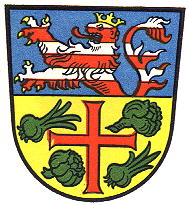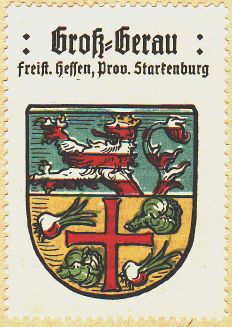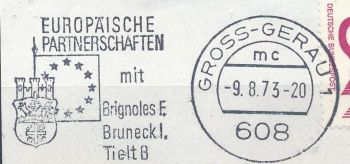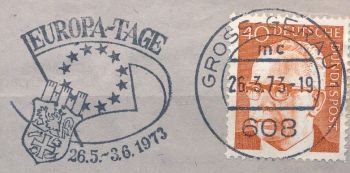Groß-Gerau: Difference between revisions
Knorrepoes (talk | contribs) m (Text replacement - "===Official blazon=== " to "{| class="wikitable" |+Official blazon |- |'''German''' | ") |
Knorrepoes (talk | contribs) m (Text replacement - "|'''German''' | ===Origin/meaning===" to "|'''German''' | |- |'''English''' | {{blazon wanted}} |} ===Origin/meaning===") |
||
| Line 13: | Line 13: | ||
|'''German''' | |'''German''' | ||
| | | | ||
|- | |||
|'''English''' | |||
| {{blazon wanted}} | |||
|} | |||
===Origin/meaning=== | ===Origin/meaning=== | ||
Revision as of 11:37, 5 July 2022
This page is part of the German heraldry portal Deutsche Wappensammlung |
Heraldry of the World |
|
German heraldry:
|
Selected collector's items from Germany:
|
GROSS-GERAU
State : Hessen
District (Kreis) : Groß-Gerau
Additions : 1939 Dornberg; 1972 Berkach; 1977 Dornheim, Wallerstädten
| German | |
| English | No blazon/translation known. Please click here to send your (heraldic !) blazon or translation |
Origin/meaning
Gross-Gerau received city rights in 1398, but there are no old city seals known. The oldest seal dates from the 16th century and shows a combination of a cabbage and an onion. These probably symbolise the importance of the horticulture in the area. Around 1600 the vegetables are combined with the cross, and the new arms are used both in seals and in buildings. The origin of the cross is not known, but it is seen on a borderstone from 1596, without the vegetables.
The present arms were granted in 1901 and combine the vegetables with the lion of Hessen.
| The arms by Hupp in the Kaffee Hag albums +/- 1925 | |
| The arms on a special cancellation 1973 |
The arms on a special cancellation 1973 |
Contact and Support
Partners:
Your logo here ?
Contact us
© since 1995, Heraldry of the World, Ralf Hartemink 
Index of the site
Literature : Stadler, 1964-1971, 8 volumes.















